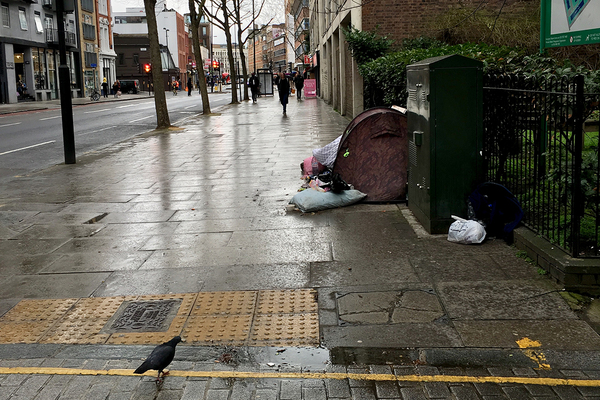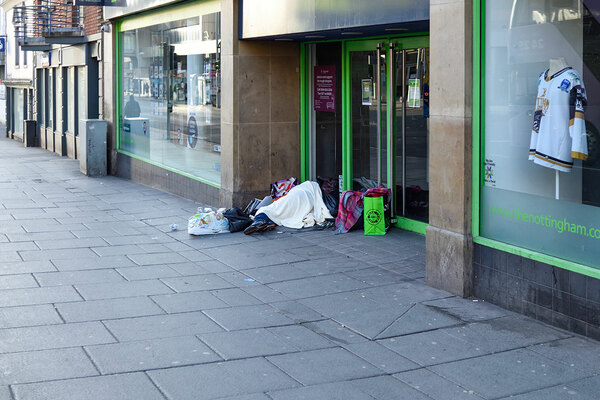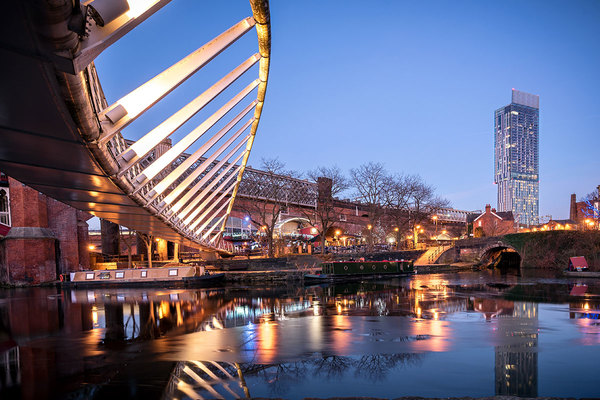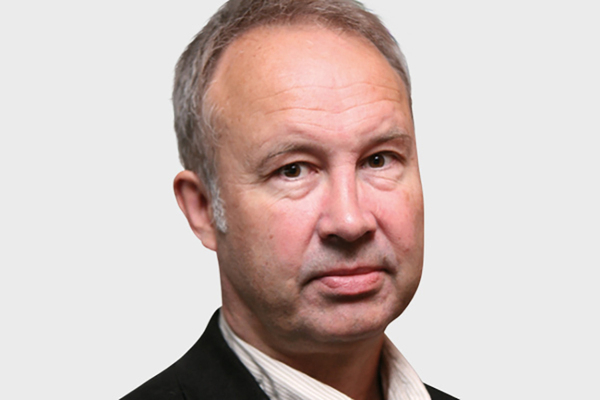You are viewing 1 of your 1 free articles
After ‘Everyone In’ got rough sleepers inside, it is time for the government to commit to ‘No Going Back’
It would be a tragedy if the government wasted this historic opportunity to help thousands of rough sleepers. Here are the five steps it must take, writes Robyn Casey
Eight weeks ago, as the coronavirus pandemic became a reality for everyone, the government issued a clear instruction to local authorities that everyone who was sleeping rough or in accommodation where it was difficult to self-isolate (such as night shelters), must be urgently supported into safe housing.
The Ministry of Housing, Communities and Local Government said that this intervention – known as ‘Everyone In’ – led to more than 5,400 people being offered accommodation in hotels, hostels and B&Bs. Whatever the exact number, the scale and speed of the work has certainly saved lives.
St Mungo’s is one of the organisations that is helping people into accommodation. We’re currently supporting more than 1,600 people in hotel rooms and have seen the extraordinary effort that councils and their partners have put into keeping people safe.
The question now is what happens next to this vulnerable group. The good news is the government had recognised this huge challenge and asked Dame Louise Casey to lead a taskforce to look at the issue and ensure rough sleepers are offered accommodation once the pandemic is over.
But the absence of a clear plan and sufficient funding from national government to provide ongoing accommodation is troubling. People based in hotels are becoming anxious about their futures as hotel operators begin to think about their return to business in the months ahead.
This concern is why St Mungo’s last week launched a new campaign called ‘No Going Back’. This invites the public to become actively involved to press home five issues we believe the government needs to act on now.
We are calling for the new taskforce to focus on:
- Ensuring no one is forced out of their emergency accommodation without being offered suitable alternative housing. A clear plan and funding to provide ongoing accommodation and support is essential.
- Providing more housing and support for people with complex needs. Since 2008, nearly £1bn of funding has been cut from support services for homeless people. Returning funding to these services will be crucial. The government committed £237m for move-on housing for up to 6,000 people who have slept rough and £144m for associated support services in this year’s Budget. This funding is a welcome start, but it does not go far enough to restore what has been lost. It should be used to help those moving on from hotels and those ready to leave supporting housing – freeing up spaces for people in emergency accommodation. But more funding will be needed if the government is serious about expanding services, including Housing First, and supporting everyone who needs it in the longer term.
- Ensuring there is enough safe and secure housing for women and survivors of abuse. Evidence and experience shows that the majority of homeless women are survivors of domestic abuse. It is crucial that the government and local authorities recognise the need for safe, secure housing with the right support in place so all women in emergency hotel accommodation can escape abuse and violence for good.
- Increasing Local Housing Allowance (LHA) rates to cover the cheapest 50% of private rented properties in each area and lifting the benefit cap so people moving on from hotels can afford private rented housing. Social housing is usually the best option for people moving on from rough sleeping, but it is unlikely that there will be enough social housing available for everyone staying in emergency hotel accommodation. Despite the welcome increase in LHA rates in April to cover the cheapest 30% of rents, housing benefits still fall short of the actual cost of rent in many areas of the country. The overall benefit cap also severely restricts the amount people can claim for housing costs in the areas with the highest rents, especially in London. To allow people to move out of emergency accommodation as quickly as possible, the government must focus on making the private rented sector more affordable.
- Continuing to pay for housing for people with no recourse to public funds who would otherwise return to rough sleeping. Emergency hotel accommodation has been made available to all people who were sleeping rough, regardless of recourse to public funds or immigration status. According to Homeless Link, between 25% to 70% of people in hotel accommodation have no recourse, depending on the local area. Many will seek work again but will be unable to claim housing benefit while they do. For people with unresolved immigration status, access to independent immigration advice will be crucial to finding a route out of homelessness. It is significantly easier and more desirable to support people to find work or resolve their immigration status if they have somewhere safe to live.
This moment represents a unique chance to improve the lives of thousands of the most vulnerable people in society. It would a tragedy if this opportunity was squandered.
The government has already committed to ending rough sleeping by 2024, but by acting to ensure everyone currently housed in hotels and other emergency accommodation is supported into specialist hostels or permanent housing, thousands could be prevented from returning to the streets.
In fact, by carrying out the recommendations in our No Going Back campaign, that commitment could be achieved sooner than planned.
Robyn Casey, senior policy and public affairs officer, St Mungo’s












